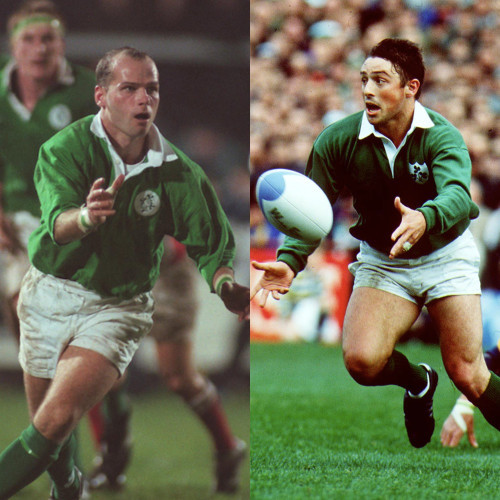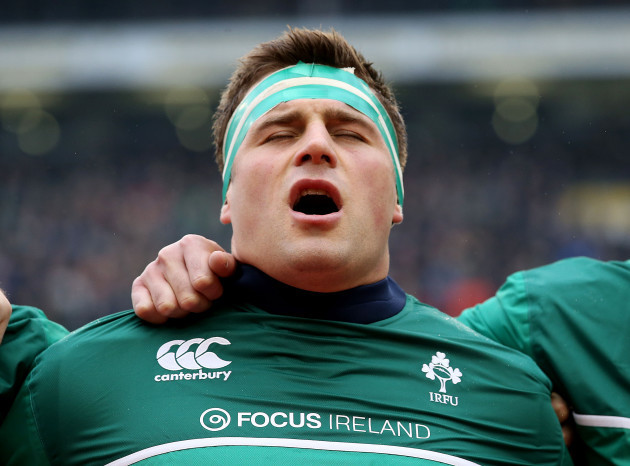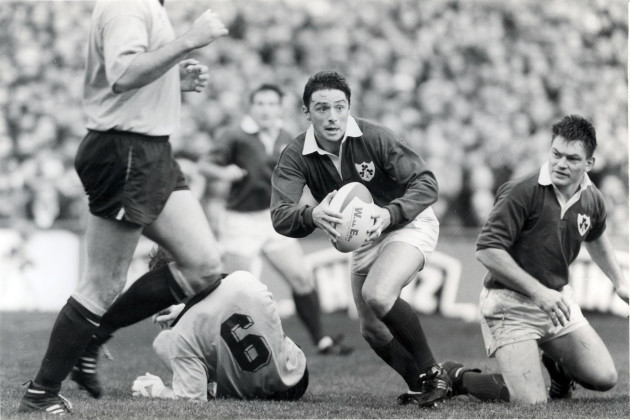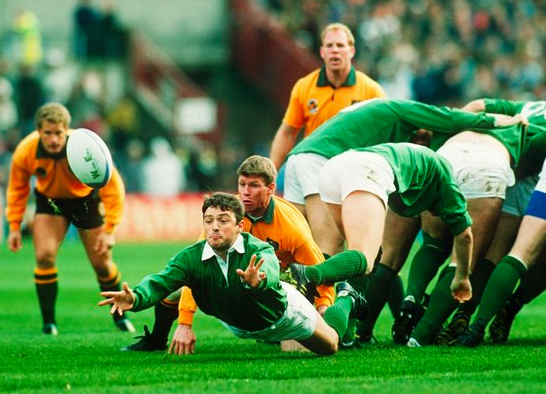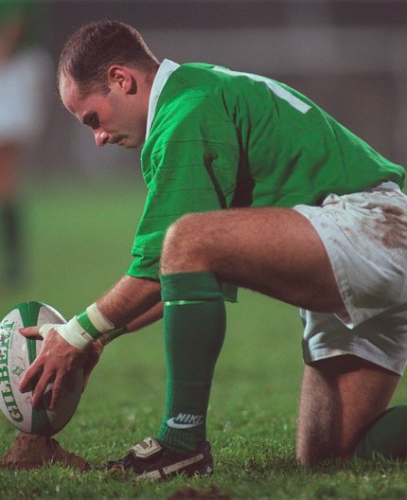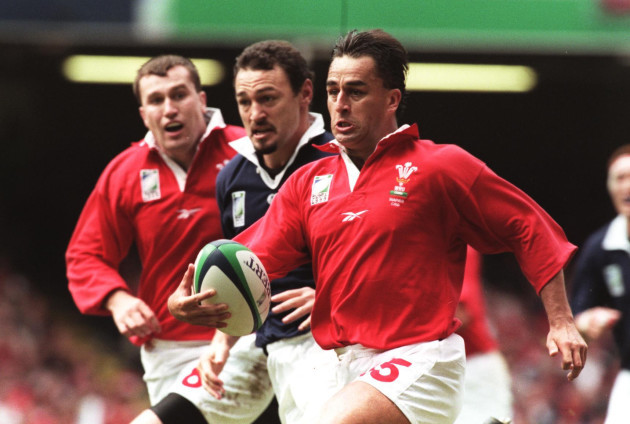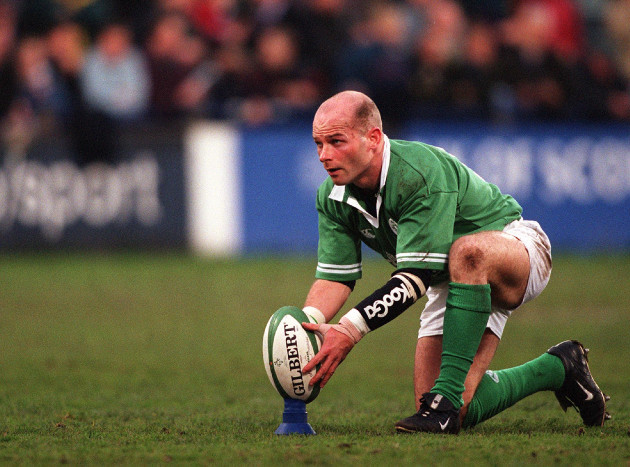“Dominance on the pitch was repeated on the terraces. Unlike the raw tribal passion that accompanied Eric Elwood’s triumph two years ago, Irish roars on Saturday were rare and muted. Home voices were gradually drowned out by the unprecedented 15,000-strong English contingent. A plaintive attempt at “Molly Malone” from the East Stand petered out before we knew if her cockles were alive. “Swing Low Sweet Chariot” was meanwhile reprised with increasing confidence as the lead grew. It may all have had something to do with confused Irish identities. After hearing the English Home Counties’ accents of Geoghegan and Paul Burke, observers at Ireland’s pre-match training mused about the “Charltonisation” of Irish rugby. Such ambiguity was amplified by Lansdowne’s advertising hoardings, plugging such tangibly Dublin companies such as “British Steel Ireland”.
THAT WAS ALAN MURDOCH writing in The Independent in January 1995, after Ireland had lost their 5 Nations opener to England.
Days later, in the same newspaper, a letter from a reader was published. Under the headline, ‘No question of identity’, Martin J Carey from Kirkby in Ashfield, Nottinghamshire – responded.
Sir, Even in victory I whiffed the familiar pong of sour grapes from Alan Murdoch’s very biased ‘ Sweet Molly sings a different tune’ (Independent, 23 January).Irish rugby supporters have the same problem relating to the identities of second generation players such as Geoghegan and Burke as their English counterparts have – none! Indeed, scanning the English squad I note such “English” birthplaces as South Africa, Malaysia, Nigeria, Wales and even Ireland.True, England supporters were excellent both at the game and Dublin’s pubs, endearing even, clutching emptied Guinness pint glasses for refilling, playing their drinking games, and always having the right change. One cravated gentleman even asked a rather miffed barman for the telephone code for the “mainland.”"Charltonisation” of the Irish soccer team has brought with it great pride in our side, not just in Ireland but from the diaspora all over the world, including, I dare say Messrs Geoghegan and Burke. All that is now needed is a worthy stadium.Perhaps Mr Murdoch should now change his Christian name.
Charltonisation? Fermentation more like”.
Identity has always been a thorny subject in Irish sport. For the ‘outsiders’, will they ever be Irish enough? And what does their presence in a team do to the aspirations and development of those with a stronger, more pure Irish lineage? Ultimately, is it unfair?
But we struggle with it. We go back and forth. We remember the iconic moments, the iconic players. Who put the ball in the English net? Irish heart and all of that.
There’s the moment in Tony Cascarino’s autobiography ‘Full Time’ where he confides in Andy Townsend that due to his mother having been adopted, he didn’t qualify to play for Ireland. Townsend’s response is revealing.
“No-one is going to accuse you of not giving your best”.
Effort. Spirit. How important are those aspects to ‘Irishness’?
Last February, it was an anthem. South African born and raised and a former Springbok, there was CJ Stander belting out Amhrán na bhFiann before Ireland faced Wales. He’d been practicing for weeks. And we loved it.
Pride. Emotion. How important are those aspects to ‘Irishness’?
Rugby’s residency rule has been a multi-layered topic of discussion over the last while. A player can live in a country for three years and then become eligible to represent his adopted home. Lashed by some, others have stood up for it.
Luke Fitzgerald has spoken about being ‘pissed off’ that ‘guys from another place’ jumped in front of him in the queue.
But, understandably, Johnny Sexton has been more diplomatic.
“I’ve played with three guys that weren’t born here”, he said last year.
They’ve given as much to the Irish jersey as I have or whoever you want to pick. If the right guys are here for three years and they want to play for Ireland and they want to give as much to the guys as I just mentioned, and it’s going to raise the standard of rugby, well, they are the rules at the moment.”
Ireland have been here before, though in a slightly different way.
In the 1991 Five Nations, Ireland took on Wales at Cardiff Arms Park. From the seven players in the backline that afternoon, none were born in Ireland. Jim Staples was born in England, so too Simon Geoghegan. Jack Clarke was born in Zimbabwe. David Curtis was born in South Africa. Brendan Mullin was born in Israel. Former Wallaby Brian Smith was at fly-half. And captaining the side was 22-year-old Rob Saunders, who was born in Nottingham, to Scottish parents.
“I moved to Ireland when I was three”, Saunders tells The42.
I had come through all the ranks in Ireland. Yes, I was born in England to Scottish parents. But having been brought up in the country and come through the ranks, nobody would’ve questioned my ‘Irishness’. It wouldn’t even have entered my brain to have thought that. Maybe other people did. Guess what? It doesn’t matter – I qualified”.
It’s come full circle for Saunders now. His youngest son, Niall, was brought up in England and is currently with Harlequins but there was never any doubt about which country he aligned himself with. He’s been capped by both the Ireland U19s and U20s in recent seasons.
“My whole family is Irish, Irish blood”, he said last year.
“Ever since I can remember I have always wanted to play for Ireland, always since I have touched a rugby ball.”
His father backs up the claim.
“There is zero doubt in his mind: he is Irish”, he says.
And I’ve said to him, ‘But what if England U20s pick you?’ And it’s, ‘No interest, no interest’. It is only Ireland. It’s actually quite funny listening to him. For my two sons, all I can remember is them wearing Irish rugby jerseys. It was always, ‘I support Leinster’, ‘I support Ulster’.
For Niall, it is slightly strange because he actually qualifies for Ireland through my wife who was born in Belfast. She had to produce her birth certificate when Niall was picked underage by the IRFU. And he was christened in Belfast, all of his cousins and aunts and uncles are from Ulster”.
Saunders excelled at London Irish – a hotbed for similarly-minded players who felt a strong affiliation with the green shirt.
One of those was Paul Burke who would make his Irish debut in 1995. Again, despite having been born in England, his sense of identity was never a complicated thing.
“I always regarded myself as being Irish”, he says.
“My Dad is from Galway and my Mum is from Kildare. They moved over here when they were 18 and settled but I was brought up in a very Irish household. All my immediate family are Irish. For me, declaring for Ireland having played for England up until U21 was a very easy decision for me. At London Irish I progressed through all the age-groups to play in the first-team with the likes of Simon Geoghegan and Jim Staples, Neil Francis was there, David Curtis, Rob Saunders, Gary Halpin. So there was a good crew of Irish-born players as well as English-born. It never really bothered me. I got the mickey taken out of me sometimes because of my English accent but I always felt very Irish in the way I was brought up and I always had that burning ambition to play for Ireland”.
A burning ambition. Is that the key to identity? If so, how do Burke and Saunders feel about the current residency situation?
“I’m a bit old-school”, Burke says.
“If you’re born there or if you’re parents are from Irish heritage, by all means you have every right to play for your country. The three-year residency rule…there’s talk of extending it to five and I’m in favour of that.
There were situations in the past with Wales and Shane Howarth and Brett Sinkinson and these chaps who were never Welsh and even Dave Hilton who played for Scotland 60-odd times and it was found out he hadn’t any Scottish heritage at all. You had a lot of Kiwis come over and think, ‘I’m never going to play for the All Blacks but if I go and get a good contract in England and stay there for more than three years then I’m eligible to play’. It doesn’t send the right message to the young, talented kids that we have on our shores. The foreign player – and albeit he may be very good – is he stunting the development of a really good kid? I’m definitely for the residency being upped to five years. Right now it’s too easy for players to come in and get capped. And it shouldn’t be easy for them”.
Saunders echoes the sentiment.
“If you’re talking about playing for a country, there has to be something inside you that makes you have that identity to play for ‘your country’”, he says.
“I’m not sure if Nathan Hughes, who’s from Fiji, feels very English after three years. That’s probably a little soon. The Vunipola brothers came across as young kids. Their father was a Tongan international and played in south Wales and they were brought up in England. That’s a legitimate pathway”.
Saunders didn’t play in the professional era while Burke was part of the transition, winning caps between 1995 and 2003 and turning out for the likes of Munster, Leicester and Harlequins at club level.
Both feel that the shift to professionalism and the ruthless grind that goes with it has led to certain elements getting lost in the mix – including the sore topic of identity.
“I think the whole area of project players and residency has gone a bit crazy”, Saunders says.
If you’ve been in the country from a very young age or have a legitimate heritage – that’s fine. But capping someone after they’ve lived in a country for three years? Well, it’s the result of professionalism, isn’t it? Once businesspeople get involved, it becomes about money. And once money comes into the game and once you have a set of rules, then it begins to change. Once it becomes a business, it becomes a very different game. When money is involved, everyone pushes everything to the nth degree to get as much of an advantage as they possibly can. That didn’t happen in the amateur era. Once it become an economic decision, it becomes a different game”.
In terms of the wider issue of getting capped, Burke falls short of saying the experience has been devalued but feels the advent of the professional game has led to more players getting international opportunities.
“There are so many more people now who have international caps than back in the amateur era, mainly because the only reason you’d get on the pitch then was if there was an injury”, he says.
“So, many talented players only got a handful of caps because if there wasn’t an injury they didn’t play. Now, you can come in for two minutes at the end of a game or be part of a tactical substitution. It’s great for the game and it unites the group of 23 players and you always know you’re going to get minutes. Back in the early and mid-nineties, I think I sat on the bench for 15 or 20 games and never got on. And not that you’d devalue caps now – playing for your country is a fantastic achievement – but there are a lot of players who have a lot of caps but, if you add up all their minutes, it probably wouldn’t come to more than three or four games.
That’s just the way the professional era has gone now”.
